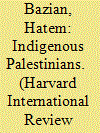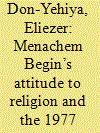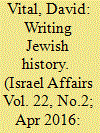|
|
|
Sort Order |
|
|
|
Items / Page
|
|
|
|
|
|
|
| Srl | Item |
| 1 |
ID:
129197


|
|
|
|
|
| Publication |
2014.
|
| Summary/Abstract |
On November 10th, 2013, the Israeli cabinet voted in a special session to authorize the demolition and removal of Umm al-Hiran, an "unauthorized," Palestinian Bedouin village in the Negev Desert, and to build in its place a new community for national Jews to be named Hiran, which had been planned and approved in early 2002. The stated reason for this demolition and forceful eviction is the lack of permits for the existing settlement, with Umm al-Hiran being one of a number of Palestinian Bedouin communities that were settled without permits and are currently subject to intense Israeli plans for removal. Umm al-Hiran itself was set-up in early 1956 by the Palestinian Abu-Alkian tribe after they had been forced to move from their ancestral tribal lands near Kibbutz Shoval in the Northern Negev.
A more critical development related to this event is the Israeli Parliament's passing of the first reading of the Prawer law. If the plan wins final approval, as it appears it will, it would cause the forceful displacement of 40,000-70,000 Arab Bedouins from the Negev, the confiscation of 800,000 dunams of Arab land, the razing to the ground of 36 or more Arab villages, and the dispossession of another generation of Palestinians. According to Adallah, the Legal Center for Arab Minority Rights in Israel, the "underlying premise of the draft bill is that there is no Bedouin land ownership," effectively negating the "population's right to property and historic affinity to the land." At the heart of this matter is the ongoing contestation of Palestinian land rights, with the Israeli government using its authority to define these policies to favor the Jewish population over the Arab. Thus, this bill, like others before it, "promotes the principle of segregation along the lines of ethnic affiliation and labeling."
|
|
|
|
|
|
|
|
|
|
|
|
|
|
|
|
| 2 |
ID:
163288


|
|
|
|
|
| Summary/Abstract |
The image of Herut as characterised by a strong linkage to Jewish religious tradition had a profound impact in the Israeli political arena. It motivated many of the religious and traditional public to support this party and later its successor, Likud. It also provided an incentive for the religious parties to join the government coalitions headed by Likud in the wake of the ‘political reversal’ of 1967. In this way, the public image of Likud as a ‘religious oriented party’ significantly contributed to the transformation of political power from Labour to Likud.
|
|
|
|
|
|
|
|
|
|
|
|
|
|
|
|
| 3 |
ID:
101635


|
|
|
|
|
| Publication |
2011.
|
| Summary/Abstract |
Mass Soviet Jewish emigration has turned Israel into the largest centre of Russian-speaking Jewry in the world, and became a critical factor in the local political landscape. This group managed to change the previous right-left balance and thus became a desirable target for any candidate seeking to head the government as well as the majority of nationwide parties. 'Russian' immigrants themselves very soon became split over the general issues of Israeli politics (ideological, civic, ethnic and class controversies), that in fact indicted their integration into the local society. Finally, since the late 1990s FSU immigrants are almost equally divided between mainstream and community-centred parties, leaning towards movements that combine both sectarian and nationwide agendas.
|
|
|
|
|
|
|
|
|
|
|
|
|
|
|
|
| 4 |
ID:
144670


|
|
|
|
|
| Summary/Abstract |
The contemporary proliferation of Jewish studies notwithstanding, the history of the Jews in modern times is still far too widely seen as an offshoot ‒ if not a function ‒ of the history or histories of others. And yet, if their evolving history is to be taken seriously, the Jewish side of things needs to be examined before all else in the light of what the Jews themselves ‒ and most especially their own leaders ‒ did, or failed to do, in the light of what were arguably their own collective interests. And this, most especially, in what deserves to be reckoned the political sphere of things. For while the old fundament of relations between Jews and non-Jews was slow to change, the affairs of the Jews and the trend of opinion among them began to undergo unprecedented change internally. Their mental and material affairs took on an authentically autonomous character. An unprecedented striving for change ‒ limited in some cases, but in others thoroughgoing in its craving for actual self-rule ‒ has come to mark them, albeit incompletely, but in total import ever more strongly; and to set a stamp upon their recent history that has proved to be no less than revolutionary.
|
|
|
|
|
|
|
|
|
|
|
|
|
|
|
|
|
|
|
|
|